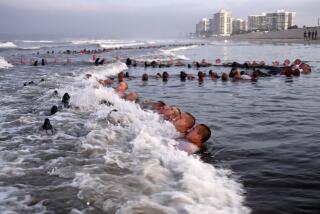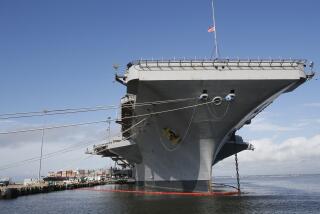Crew Errors Cited for Stark Disaster : Panel’s Report Also Blames Officers, Says Weapons Functioned Correctly
- Share via
WASHINGTON — Errors by the officers and crew of the U.S. Navy frigate Stark were to blame for the ship’s vulnerability to an Iraqi missile attack that killed 37 men last month, a House Armed Services Committee report said Saturday.
An investigation by the committee’s staff found that the radar and weapons systems aboard the Stark performed correctly when the ship came under attack in the Persian Gulf on May 17, but that human error prevented the equipment from being used to defend the ship.
It also faulted the Iraqi air force for its policy of firing at ships in the gulf without identifying them first. “The pilot was firing at a radar blip with no way of knowing the nationality or type of vessel he was firing at,” the report said.
It added: “Because of Iraqi tactics, this was an accident waiting to happen.”
Ship’s Officers Blamed
But the committee said the Stark’s officers were to blame for the fact that the ship did not take effective protective measures.
“They could have done--and should have done--a lot more,” said Rep. Les Aspin (D-Wis.), chairman of the panel.
“With 20/20 hindsight, the evidence we now have shows the Stark should have, first, radioed a warning to the Iraqi Mirage (fighter jet) much sooner. . . . And second, the Stark should have turned broadside to the Mirage to unmask all its equipment--radar and weapons--so they could be brought into action,” he said.
The crew of the Stark tracked the approaching Iraqi jet on radar from a distance of 70 miles, but the ship’s tactical action officer did not order a warning sent until the plane had closed to within 15 miles. That was well within the 40-mile range of the Iraqi jet’s two Exocet missiles.
Warnings After Launch
“The radio warnings broadcast by Stark may have been sent after one or both missiles were launched,” the report noted.
After the missiles were launched, at least two of the Stark’s radar systems should have detected them and warned the crew, it said.
One of the systems, the SLQ-32 radar receiver, probably did detect the incoming Exocet, the report said. But its warning may have been ignored because the crew had turned off the device’s sound alarm, which sounded so often that operators considered it a distraction.
A second device, the Phalanx anti-missile system, could not see the oncoming Exocet because the ship had not been turned broadside to the threatening plane; the Phalanx sits on the ship’s afterdeck and cannot look (or fire) directly forward.
Highly Maneuverable Ship
“The evidence does suggest that had the ship been turned broadside to the approaching Mirage, which could be accomplished in seconds by a highly maneuverable ship like a frigate, the equipment on board should have been able to detect and engage the incoming Exocets,” the report said.
The report, based on a trip to the gulf by four committee aides a week after the May 17 attack, was signed by Reps. Aspin, William L. Dickinson of Alabama, the senior Republican on the panel, and Bill Nichols (D-Ala.), the chairman of the investigations subcommittee.
Aspin said the committee did not attempt to apportion blame for the failures, largely because the Stark’s four key officers refused to be interviewed by the panel’s staff.
But the Stark’s captain, Glenn R. Brindel, gave new details in a written statement to the committee.
He said he left the bridge at about 9 p.m., after he had been told the Iraqi aircraft was about 120 miles away and heading toward the ship.
Stops at His Cabin
On the way from the bridge to the ship’s electronic combat information center, he said, he stopped at his cabin to “make a head call”--Navy jargon for using the toilet.
“I paused at my desk momentarily to look at some paper work and heard and felt the first hit,” Brindel wrote.
Since the Stark episode, Aspin said, the Navy has changed its rules of engagement in the gulf to require a ship to go to “general quarters”--the highest stage of combat readiness--whenever an unfriendly plane approaches within missile range.
And he said the United States has urged Iraqi authorities to order their pilots to identify targets in the gulf before they shoot. Iraq, which is at war with neighboring Iran, has warned that it will attack any ship that it suspects of trading with Iran.
“They do not take a great deal of care to identify targets before they hit them, and they kind of fire at blips as they appear on the screen,” Aspin said.
“The Iranians check very carefully their target before they hit it,” he said.
The report concluded that “political realities” support the Iraqi position that the attack was a mistake.
More to Read
Sign up for Essential California
The most important California stories and recommendations in your inbox every morning.
You may occasionally receive promotional content from the Los Angeles Times.














